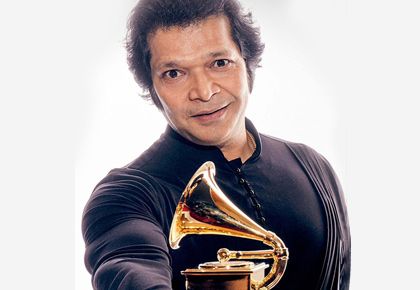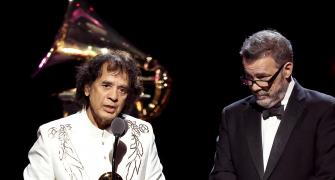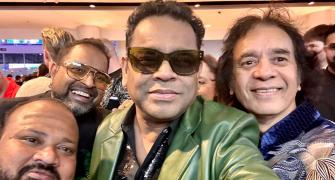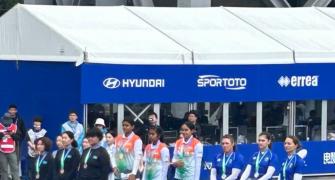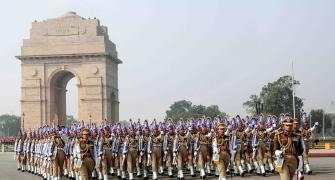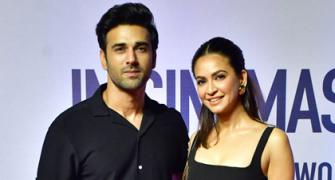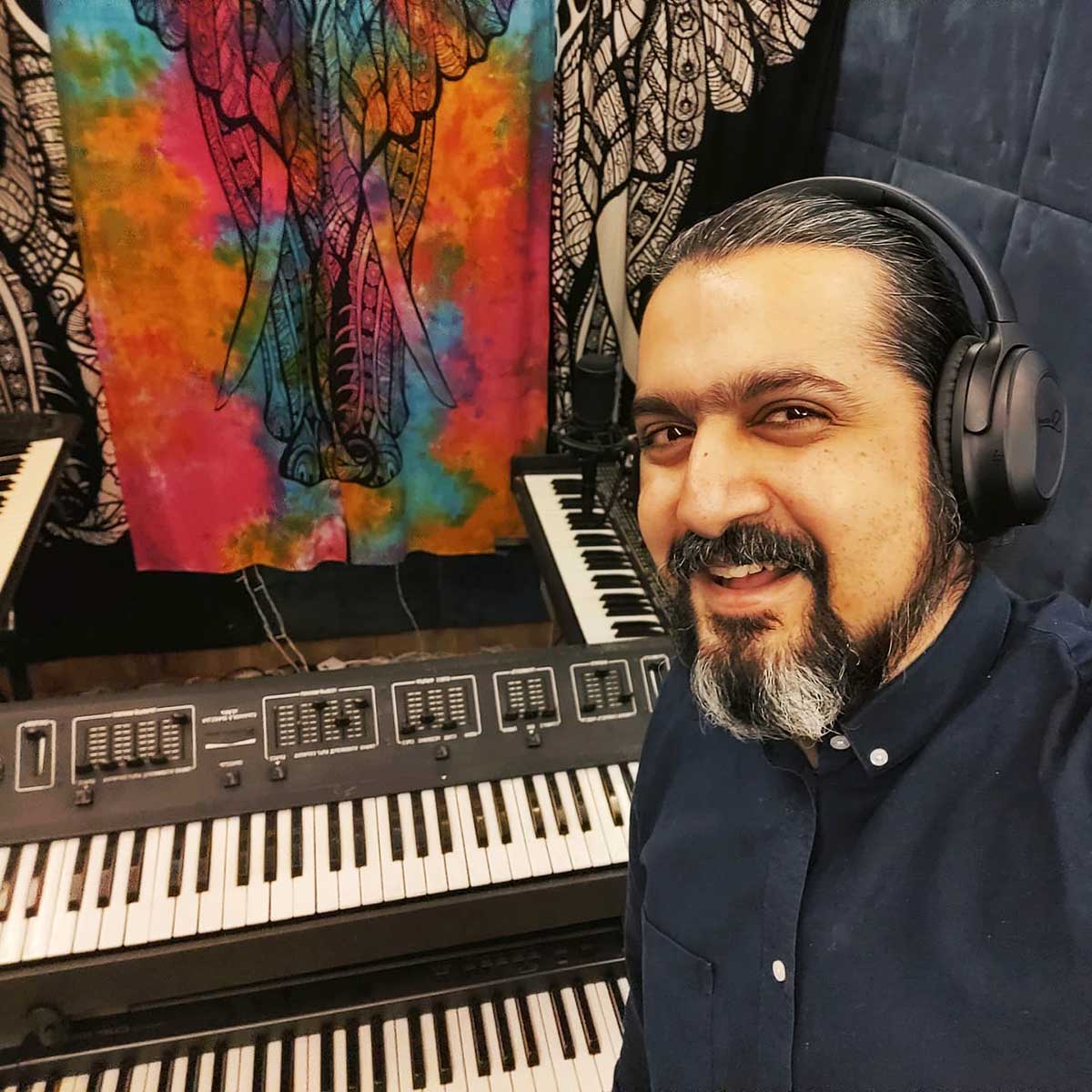'I will always cherish the fact that I received the first big award of my life, actually two, in the company of legends for an incredible collaboration.'

He was handed the flute by his uncle and guru Hariprasad Chaurasia when he was just four-and-a-half years old.
The most accomplished of his uncle's disciples, Rakesh Chaurasia has been enthralling audiences at classical and semi-classical concerts in the UK, US, Europe, South Africa and Japan.
He was invited to conclude the 24-hour live music broadcast to a worldwide audience on BBC radio during Queen Elizabeth's silver jubilee celebrations.
He has received the Indian Music Academy Award from then President A PJ Abdul Kalam in 2007, the Aditya Birla Kalakiran Puraskar the following year and the Guru Shishya Award in 2011.
He has just won two Grammys with Ustad Zakir Hussain, Edgar Mayer and Bela Fleck for As We Speak (Best Contemporary Instrumental Album), and Pashto (Best Global Music Performance).
"Whether I get any more awards or not, this win, and the stalwarts with whom I got it with, will always remain unforgettable," Rakesh Chaurasia tells Rediff.com Senior Contributor Roshmila Bhattacharya in the first of a fascinating two-part interview.
Five years from now, when you look back on your double Grammy win, what is it that you will remember?
Receiving the Grammy alone, for an album you had composed, is one thing, but standing on the same stage and receiving it with like Ustad Zakir Hussain and Edgar Mayer, who have won five awards each, made it really special.
I will always cherish the fact that I received the first big award of my life, actually two, in the company of legends for an incredible collaboration.
As We Speak was released, nominated and won the biggest music award in the same year and that is a huge achievement for me.
Whether I get any more awards or not, this win, and the stalwarts with whom I got it with, will always remain unforgettable.

In our country, whenever anyone wins big globally, it changes their life and career. It happened with Ricky Kej earlier after his three Grammy wins.
Will it make a difference, personally and professionally, to you?
I think what it will do is increase my responsibility as expectations have risen now.
The flood of congratulatory messages over the last few days -- almost 600-700 WhatsApp texts alone from people whose numbers were not even saved in my phone list -- has been overwhelming.
Particularly those from seniors who wrote, 'Nice to see you with Zakir Hussain.'
That in itself is something I will always cherish.
When I would accompany Hariji (his guru, flautist Pandit Hariprasad Chaurasia) on stage and watch Zakirbhai perform with him, I would wonder if in this lifetime I too would get an opportunity to play with him.
God is kind, I did many solo shows with him.
I believe that if you are a good person, your goodness is reflected on your face.
Woh kehte hain na, hasta hua noorani chera.
And if you are pure soul, your music is pure too.
For me Hariji and Zakirbhai are the Gods of music and God is always with them which is why whatever they do, it is a success.
Some call it karma, I believe it's because they are such pure souls.

Tell us about the Zakir Hussain you know. What sets him apart?
I've seen musicians leave the venue immediately after a concert.
This can offend someone who has driven miles, sometimes four-five hours, just to shake hands and click a photograph with them.
For someone who reveres them as God, it is disappointing when you get to see God, but not meet Him.
Zakirbhai always stays back, will meet everyone, no matter how tied up he is.
There are some musicians God has moulded with a lot of love, then broken the mould.
Pandit Ravi Shankarji, Hariji, Shivji (santoor maestro Pandit Shivkumar Sharma), Amjad Ali Khansahab (sarod maestro) and Zakirbhai are some such musicians.
Pure souls, whom other artistes enjoy listening to.
It was Zakirbhai who got me to meet Bela Fleck and Edgar Myers.
We had our first trial session at his home in San Francisco to see if my flute could gel with their kind of music.

Bela Fleck, who has won 17 Grammys and been nominated 39 times, is an American banjo player who plays bluegrass, jazz, rock and western classical music while Edgar Meyers is an American bassist and composer who also plays bluesgrass, newgrass, jazz and western classical. Zakir Hussain is a tabla player, percussionist, music composer and producer.
How much of a challenge was it for you to collaborate with such a diverse trio of legends?
In the beginning, I had to think a lot about how to incorporate their phrasing in my music.
It was a challenge but fortunately, they liked the sound of my flute and my style of playing.
That's how I jumped on board.
And when this album was conceived, I was a part of it.
We recorded it live, in just two days.
Live?
Yes today, when you can technically rectify sur and taal in the studio, these guys were very particular about recording live.
There was no post-production, no corrections, nothing.
We would start at 10 am and go on till almost 10 pm, playing each of the 12 songs three, four, even five times.
It was physically and mentally exhausting for me, but there was no stress so I enjoyed the process hugely.
In between, we went on tour, but whenever we had time, we could drop by the studio which was in the US.
The best version of each song is in the album.

Tell us about Pashto.
Pashto means rhythmic cycle of seven beats and was composed by Zakirbhai.
He had heard the man on the street playing such hybrid music which grew out of an exchange of musical instruments between two countries, our shehnai and nagara going to them and their bagpipes coming to India.
When Zakirbhai and I landed in Scotland for a tour, he asked the musicians there to play something and we would see what we could do from our side.
When the bagpipes started playing, he told me this was something he had heard in his childhood.
On that music, he composed Pashto which must have been in his head and fine-tuned.
It was released and won us a Grammy.
If we hadn't experimented or thought about it and planned something big and complicated, it might not have touched as many hearts.
Your father, Ganeshprasad Chaurasia, is a popular tabla player. What made you pick up the flute?
I spent my childhood with my uncle Hariji.
In fact, I call him Babuji and my father uncle.
Whenever he was home, Babuji would play the flute all day and by default, the sound attracted me.
So when I was asked if I wanted to do something in music, I told him I wanted to play his instrument.
I didn't even know then that it was called the flute.
I was four-and-a-half years old when he presented me with a small flute.
When I started playing that flute, I wasn't thinking of being on stage, of audience and awards.
It was just a hobby.
But what was once a toy has now become my profession and when your passion becomes your profession, it doesn't become a job.
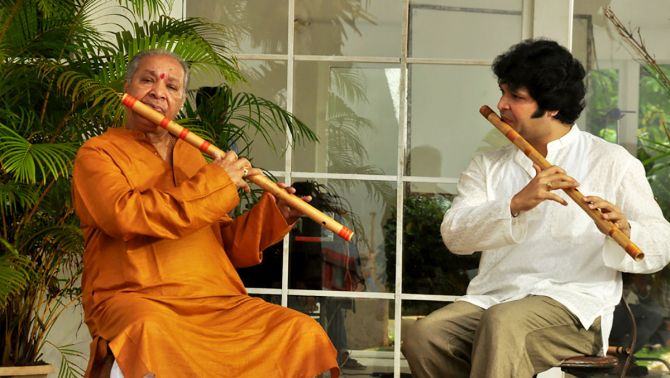
Do you still have that flute Hariji gave you?
Of course, but now the flute has become bigger.
I'm travelling all over the world with a piece of bamboo.
One piece of advice your guru gave you which still works for you...
Every time I go to class, he has a new dish to serve.
I often wonder yeh soch kahan se aata hain unke dimaag mein? (from where do such thoughts come into his mind?).
I guess it's because he is thinking of his music 24x7 and not just when he is playing.
Even when he is talking to someone or waiting at the airport to catch a flight, his mind is focused on his music.
Such dedication is inspiring.
